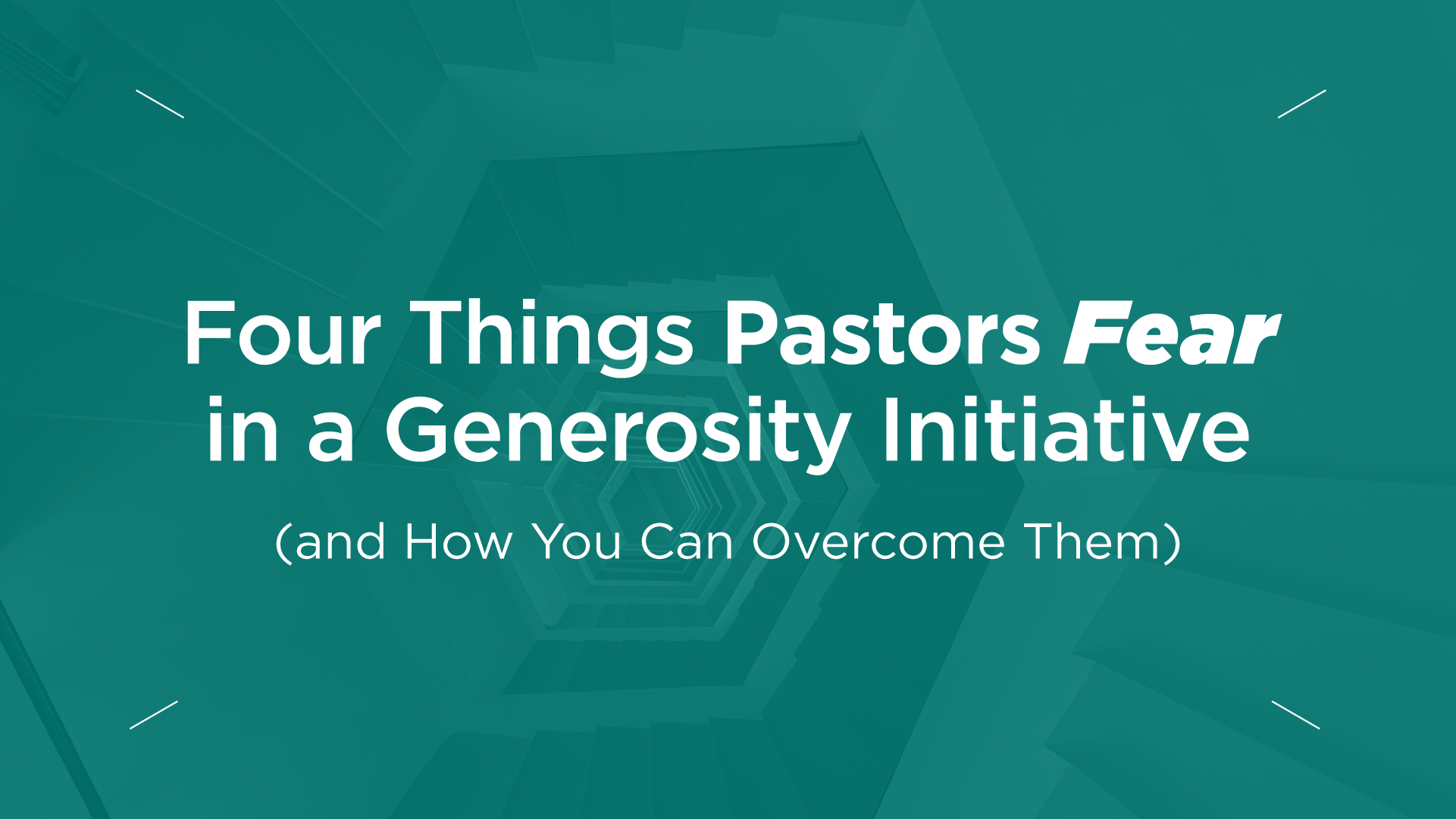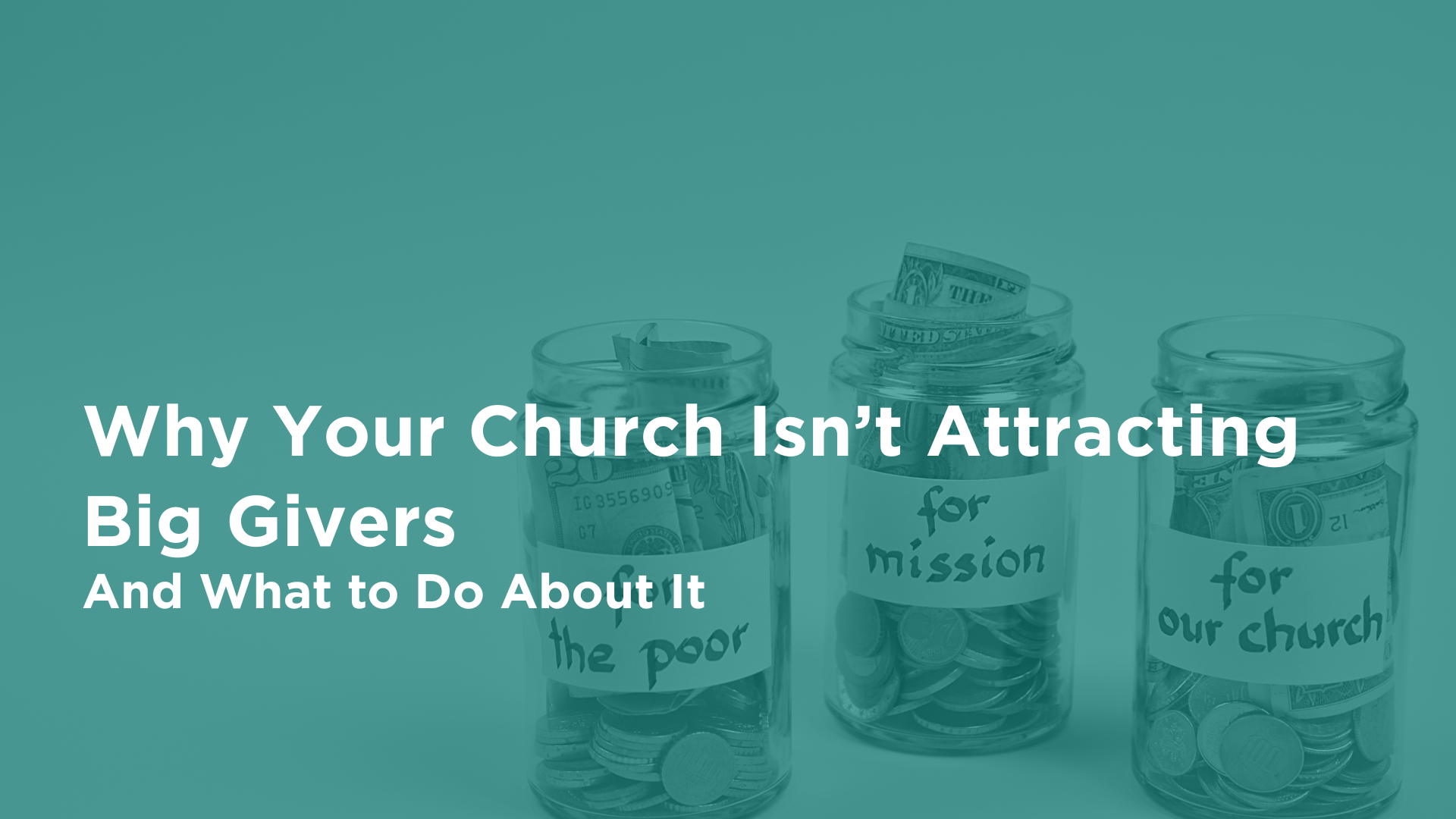Four More Things Pastors Fear In A Generosity Initiative (and How You Can Overcome Them)
In my previous post, I talked about pastors having some level of anxiety or concern about leading a generosity initiative – anxiety that is usually rooted in a fear of some kind. At Generis, we believe one of our roles is to help pastors and church leaders identify their underlying fear and equip them to lead through it.
Over the years, some common fears have come to light. I named four things pastors get anxious about when they think about a generosity initiative in the previous post. As I thought more about it, four more came to mind:.
I don’t have time for a generosity initiative.
We hear this a lot. The ongoing demands of ministry and running a church leave seemingly little margin for a major giving initiative. And then there is the concern that the giving initiative consumes all of the attention of the staff for a season.
Make no mistake, executing a well-run giving initiative takes time. It will take time from staff or laity, or both.
And it can be done without compromising your everyday ministry. Planning ahead and allowing yourself plenty of time to lay out the initiative and organize it is one of the keys. For a smaller church, allow 5-7 months for proper planning, organization, and execution. For a larger church, allow 10-12 months.
You must have a team of people who are focused on executing a comprehensive campaign plan. Someone to lead the team and then people to take ownership of the various areas of responsibility. To the extent that your giving initiative involves key staff, you may need to reallocate some of their responsibilities temporarily. You don’t want everyday ministry responsibilities to drop through the crack while you are executing a major giving initiative.
And no need to worry about the giving initiative being all-consuming to the church in a season. A giving initiative needs to have proper attention but not to the exclusion of all the other things your church is doing. One way to think of it is that the giving initiative gets “top billing” but not “exclusive billing” in the public portion.
I don’t want to ask for money.
This one is pretty common. A properly executed giving campaign in a church does not rely so much on asking people for their money. The main focus is on growing givers’ hearts. In other words, discipleship, and formation in the area of money and possessions.
So much of the language and messaging in a giving initiative tends to focus on giving to the church and to the projects that are being funded. That’s important but not to the exclusion of talking about givers’ hearts. In other words, where does the money come from? Long term growth in giving to God’s work in and through a local church occurs when we focus on spiritual formation and a better understanding of what it means to view our money and possessions from God’s perspective.
Asking is a part of a giving initiative. The asking is not so much a person-to-person ask as it is a corporate ask. In other words, cast vision, inspire your people, teach them well and call them to a season of prayer. Then provide opportunities to respond. This could be an advance commitment event for leaders. Or a commitment Sunday in the worship services for the congregation at large.
And consider this. What if asking were to be seen as ministry? You are asking God’s people to consider giving from what God has provided. For the provision of what God is doing in His Church. That sounds to me like we are ministering to our people, not just asking them for money. Think about it: Rather than having a concern about asking for money, what would it look like to embrace asking as ministry?
I don’t know how to do this.
There are a lot of things that seminary did not teach you how to do and this is one of them. The good news is that there is a lot of information out there on the internet about how to run a giving initiative in a church. We have published a number of free ebooks about giving initiatives and capital campaigns. Here is a link to two that might be helpful, The Ultimate Church Capital Campaign Guide and The Hidden Costs of a Do It Yourself Campaign.
If you are a pastor and you have never done a major giving campaign, chances are you have friends who have done one. Ask them about their experiences in leading giving initiatives. What did they learn? If they had it to do over again, what would they do differently? What was the hardest thing about your campaign?
And, additionally, there are consulting firms that can assist. The conversation about how to do a campaign would not be complete without mentioning this. If you have never done a major capital campaign before, it might be good to engage the assistance of a professional firm that specializes in helping churches. Most churches are concerned about the fee that they would pay to a professional firm. I understand that. But think of the fee you would pay them not as an expense but rather an investment in doing it properly.
I’m concerned about the economy.
I am hearing this one a lot right now. The economy is potentially a concern, but it is not high on the list. The reality is that church giving is more at risk for things inside the walls than factors outside the walls.
What do I mean by that? Well, if something happens to the senior leader of a church ‚— say they leave or perhaps resign under adverse circumstances — that will almost always have a significant effect on giving, even if only short term.
If a church is not healthy, that, too, will have a bigger impact on giving than the economy. While the economy might be a factor, it is probably not a primary factor in church giving.
And then there is the bigger question: “What does God want to do in and through our church?” Isn’t that a much better place to focus our attention than the state of the economy? After all, one of the great giving stories of the Bible, the Macedonian churches in II Corinthians 8:1-5, occurred in the midst of people who were experiencing extreme poverty. I love the verse where it says, “Their abundance of joy and their extreme poverty have overflowed in a wealth of generosity on their part.”
Let’s seek that for our churches and not worry so much about the economy!
Leading a giving initiative can be fraught with concerns and fears. I hope addressing these 8 common fears and concerns of pastors and churches has helped you see that most, if not all, of them are unfounded. And that will help you move into your next major giving initiative in a spirit of freedom and trusting God more than ever before.
Was this post helpful to you? Is there something that struck a familiar note with you? Or perhaps something I missed? I’d love to hear from you. Drop me a line at jim@generis.com.
Share this
You May Also Like
These Related Stories

Four Things Pastors Fear in a Generosity Initiative (and How You Can Overcome Them)

Why Your Church Isn’t Attracting Big Givers


No Comments Yet
Let us know what you think